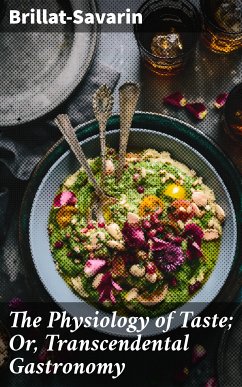In "The Physiology of Taste; Or, Transcendental Gastronomy," Jean Anthelme Brillat-Savarin embarks on a profound exploration of gastronomy that transcends mere culinary instruction. Written in 1825, this seminal work intertwines philosophical musings and sensory experiences to elevate the act of eating into an art form and a subject of intellectual inquiry. Brillat-Savarin's literary style is characterized by its rich, eloquent prose peppered with wit and personal anecdotes, offering a delightful narrative that ranges from the physiological basis of taste to cultural reflections on food practices in various societies. His insights reveal the relationship between food, pleasure, and identity, situating the text within the broader context of 19th-century thought that began to recognize the importance of sensory experience in human existence. Brillat-Savarin was not merely an epicurean but a lawyer and politician whose appreciation for food was deeply rooted in his life experiences in post-revolutionary France. Having faced exile and witnessing the vast tapestry of culinary traditions, he sought to express how gastronomy reflects societal values. His background informs his multifaceted approach to taste'Äîmelding science, philosophy, and art'Äîinspiring readers to appreciate the complex interplay between food and humanity. This book is a must-read for anyone interested in the intricacies of taste and food culture. Brillat-Savarin's timeless observations resonate with contemporary discussions about gastronomic identity and the significance of culinary experiences. Readers will find themselves captivated by his insights and enchanted by his prose, making "The Physiology of Taste" an essential addition to the library of any culinary enthusiast or philosophy aficionado.
Dieser Download kann aus rechtlichen Gründen nur mit Rechnungsadresse in A, B, BG, CY, CZ, D, DK, EW, E, FIN, F, GR, H, IRL, I, LT, L, LR, M, NL, PL, P, R, S, SLO, SK ausgeliefert werden.









